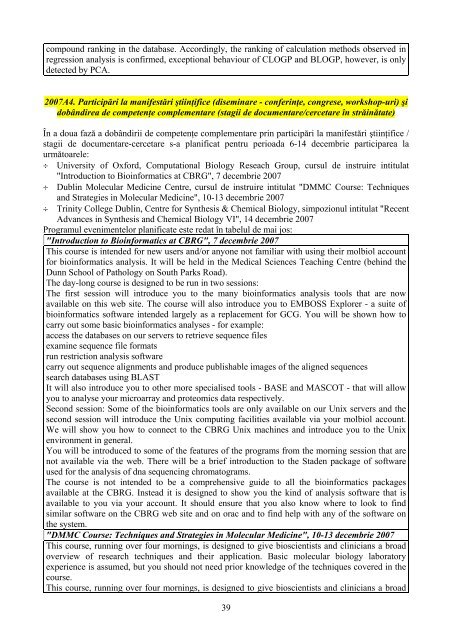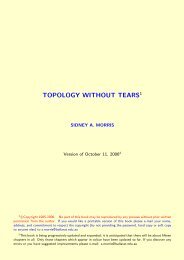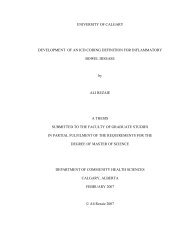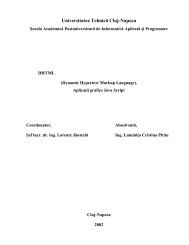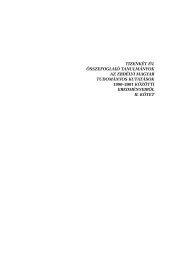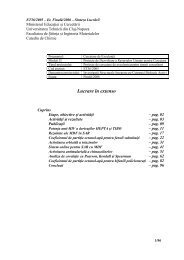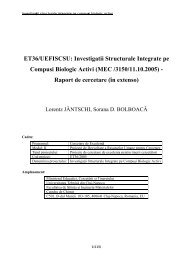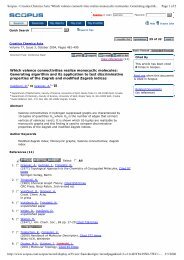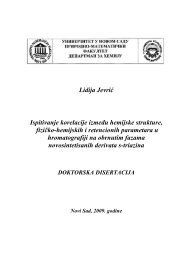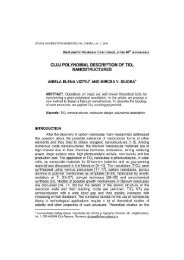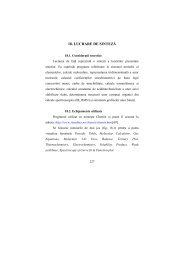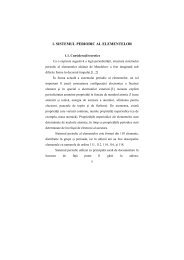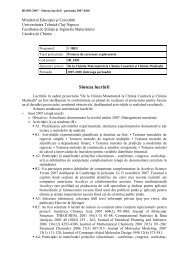Raport de cercetare - Lorentz JÄNTSCHI
Raport de cercetare - Lorentz JÄNTSCHI
Raport de cercetare - Lorentz JÄNTSCHI
Create successful ePaper yourself
Turn your PDF publications into a flip-book with our unique Google optimized e-Paper software.
compound ranking in the database. Accordingly, the ranking of calculation methods observed in<br />
regression analysis is confirmed, exceptional behaviour of CLOGP and BLOGP, however, is only<br />
<strong>de</strong>tected by PCA.<br />
2007A4. Participări la manifestări ştiinţifice (diseminare - conferinţe, congrese, workshop-uri) şi<br />
dobândirea <strong>de</strong> competenţe complementare (stagii <strong>de</strong> documentare/<strong>cercetare</strong> în străinătate)<br />
În a doua fază a dobândirii <strong>de</strong> competenţe complementare prin participări la manifestări ştiinţifice /<br />
stagii <strong>de</strong> documentare-<strong>cercetare</strong> s-a planificat pentru perioada 6-14 <strong>de</strong>cembrie participarea la<br />
următoarele:<br />
÷ University of Oxford, Computational Biology Reseach Group, cursul <strong>de</strong> instruire intitulat<br />
"Introduction to Bioinformatics at CBRG", 7 <strong>de</strong>cembrie 2007<br />
÷ Dublin Molecular Medicine Centre, cursul <strong>de</strong> instruire intitulat "DMMC Course: Techniques<br />
and Strategies in Molecular Medicine", 10-13 <strong>de</strong>cembrie 2007<br />
÷ Trinity College Dublin, Centre for Synthesis & Chemical Biology, simpozionul intitulat "Recent<br />
Advances in Synthesis and Chemical Biology VI", 14 <strong>de</strong>cembrie 2007<br />
Programul evenimentelor planificate este redat în tabelul <strong>de</strong> mai jos:<br />
"Introduction to Bioinformatics at CBRG", 7 <strong>de</strong>cembrie 2007<br />
This course is inten<strong>de</strong>d for new users and/or anyone not familiar with using their molbiol account<br />
for bioinformatics analysis. It will be held in the Medical Sciences Teaching Centre (behind the<br />
Dunn School of Pathology on South Parks Road).<br />
The day-long course is <strong>de</strong>signed to be run in two sessions:<br />
The first session will introduce you to the many bioinformatics analysis tools that are now<br />
available on this web site. The course will also introduce you to EMBOSS Explorer - a suite of<br />
bioinformatics software inten<strong>de</strong>d largely as a replacement for GCG. You will be shown how to<br />
carry out some basic bioinformatics analyses - for example:<br />
access the databases on our servers to retrieve sequence files<br />
examine sequence file formats<br />
run restriction analysis software<br />
carry out sequence alignments and produce publishable images of the aligned sequences<br />
search databases using BLAST<br />
It will also introduce you to other more specialised tools - BASE and MASCOT - that will allow<br />
you to analyse your microarray and proteomics data respectively.<br />
Second session: Some of the bioinformatics tools are only available on our Unix servers and the<br />
second session will introduce the Unix computing facilities available via your molbiol account.<br />
We will show you how to connect to the CBRG Unix machines and introduce you to the Unix<br />
environment in general.<br />
You will be introduced to some of the features of the programs from the morning session that are<br />
not available via the web. There will be a brief introduction to the Sta<strong>de</strong>n package of software<br />
used for the analysis of dna sequencing chromatograms.<br />
The course is not inten<strong>de</strong>d to be a comprehensive gui<strong>de</strong> to all the bioinformatics packages<br />
available at the CBRG. Instead it is <strong>de</strong>signed to show you the kind of analysis software that is<br />
available to you via your account. It should ensure that you also know where to look to find<br />
similar software on the CBRG web site and on orac and to find help with any of the software on<br />
the system.<br />
"DMMC Course: Techniques and Strategies in Molecular Medicine", 10-13 <strong>de</strong>cembrie 2007<br />
This course, running over four mornings, is <strong>de</strong>signed to give bioscientists and clinicians a broad<br />
overview of research techniques and their application. Basic molecular biology laboratory<br />
experience is assumed, but you should not need prior knowledge of the techniques covered in the<br />
course.<br />
This course, running over four mornings, is <strong>de</strong>signed to give bioscientists and clinicians a broad<br />
39


